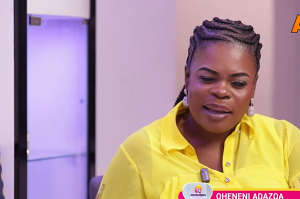Oral Village Ideas
By
Daniel Appiah-Adjei
Anger Is One Letter Short Of Danger
“To err is human, to forgive, divine” is a profound statement made by Alexander Pope. It points out that it is normal to make mistakes, including the type that hurts others. We probably have all made mistakes. And when we did so, we may have dismissed our mistakes with a simple, Ahh! Sorry about that, I am only human, you know. Yes, we’re only human; that is why pencils have erasers. But have you noticed when we are the victim of someone’s mistake, we may become angry and hold it against them? In other words, if we make a mistake, it’s because we’re only human, but if they make a mistake, it’s because they are stupid! Not rational, isn’t it?
If we catch ourselves becoming angry by someone’s carelessness, why not stop and forgive them? It’s an opportunity to transcend our humanity and act in a divine way. The purpose of forgiveness is not to absolve others, for who are we to judge them? Rather, the purpose is to free ourselves from the toxicity of resentment, animosity, and bitterness. Those who hold a grudge are held hostage by fear, guilt, and anger (ANGER is one letter short of DANGER). It doesn’t make sense to chain up ourselves to negative feelings and limiting beliefs. Isn’t it much better to choose forgiveness, or the path of peace, understanding, and acceptance?
Despite the above comments, are you still finding it difficult to forgive someone you know? If so, read the story by Akwasi Amankwaa of Atwima Gyekye in the Atwima Kwanwoma District of Ashanti Region, for it may help you become aware of the butterfly in the caterpillar, the towering pine in the acorn, and the saint in the sinner. Akwasi Amankwaa, one of my faithful friends created a story about a cat according to him, called Ewiase
The Story of Akwasi Amankwaa
I was in the Humane Society, in the adoption room for cats. As I peered through the bars of the cage in front of me, I saw vacant, yet beautiful, blue eyes. They belonged to a six-year-old stray cat named Bobby. He had reddish-brown and black stripes and his front paws were enormous, reminding me of a tiger. When I spoke to the attendant about him, she warned me that Ewiase did not like to be handled and he should not be adopted by anyone looking for an affectionate cat. Good grief, I thought, who’s going to adopt an unfriendly six-year old cat? I figured I’d better rescue him from an almost certain death, so I adopted him.
His original owner must have loved him because he was declawed. Not that declawing a cat is a sign of love, but paying for the operation is. Ewiase probably escaped from the home of his owner and roamed the streets. One day, however, he was brutally attacked. Someone hacked off most of his tail and smashed his pelvis. Because the stub of his tail made him resemble an end of a cat, the attendants at the Humane Society called him, Ewiase.(This world). His damaged pelvis caused his rear end to come to a point, and instead of walking gracefully, Ewiase would hop about. Poor Ewiase was traumatized.
When he first arrived in his new home, he hid under a bed for a day or so. But hunger pangs finally convinced him to come out from his hiding place. Whenever we picked up the broom to sweep the floor, he fled in terror. It took a long time for him to realise the broom was an instrument to clean the floor, not a weapon to beat him with.
After two years, Ewiase was finally secure enough to come of his own accord and jump into my lap. Whenever he would do so, I would gently pet him. However, after a few minutes, he would suddenly bite my arm, drawing blood, and then hop away as quickly as he could. Though the bites were painful and messy, I never did get angry. After all, I understood. Ewiase was experiencing a flashback and defending himself the only way a declawed cat could, by biting.
The Difference between Ewiase and us
Why am I writing about Ewiase? Because many of us, like him, have been injured psychologically to one degree or another. Perceiving an imagined threat, we snap at others. The difference between Ewiase and us, however, is that his injuries were clearly visible: a missing tail, pointed rear end, and an inability to walk correctly. Not so with those we meet daily. Their injuries are psychological and hidden from view. As a result, we usually fail to realize their attacks are not due to viciousness, but to the pain they have experienced.
So, the next time your boss, spouse, or anyone else unfairly attacks you, don’t get angry. Instead, pause, and imagine it is Ewiase biting you. If it were him, you wouldn’t get angry, would you? If we would treat others as well as we would treat that poor cat, it would be a much better world. Besides, sometimes WE are Ewiase, attacking others for no clear reason. At
such a time, let’s hope our victims will recognise us as Ewiase and forgive us.
As Ye Sow, So Shall Ye Reap
You have heard people say, “what goes around, comes around”. But have you given that saying much thought? It is actually a modern way to express ancient wisdom. The Old Testament stated it this way . . . they that plow iniquity, and sow wickedness, reap the same. (Job 4:8). At least 50 years before the birth of Christ, the Roman statesman, philosopher, and orator, Marcus T. Cicero, said, As you have sown so shall you reap. And in the New Testament we find, whatsoever a man soweth, that shall he also reap. (Galatians 6:7)
The idea that we reap what we sow is more than a cute saying or worthwhile principle. It is an immutable law of nature with as much force as the law of gravity. We ignore this law at our own risk. In ancient times, most people had a clear understanding of the law because of their agrarian experience. By observation they learned the following facts.
1) If you sow wheat, you will reap wheat. If you sow corn, you will reap corn. If you raise cattle, you will reap cattle. If you breed pigs, you will reap pigs. This is the law of like begets like. Pigs do not beget chickens, nor does corn bring forth potatoes.
2) If you sow today, you cannot reap tomorrow. It takes time for your labor to bear fruit.
3) If you sow hundreds of seeds, you will harvest thousands. Your yield will be far greater than you have sown.
It should be clear from the first fact (like begets like) that if you sow kindness, you will reap kindness, but if you sow prejudice, you will reap prejudice, not understanding. Similarly, sowing hatred will reap hatred, not compassion. This powerful law can help you receive whatever you wish. Do you want to be loved? Obviously, you must first love others. When you do so, they will return love to you. Do you want to make more money? If so, you must first make more money for someone else. Its only common sense, isn’t it? After all, if you make your employer rich, you will be well rewarded. If not, you can always change jobs and move to a company that will recognise and reward you. By applying the law of As Ye Sow, So Shall Ye Reap, we can gain control of our lives. That is exciting news. But why are so many of us blind to this important law? Count your anger.
By His Grace, I shall be back
danappiah2@yahoo.com
Opinions of Friday, 20 August 2010
Columnist: Appiah-Adjei, Daniel














